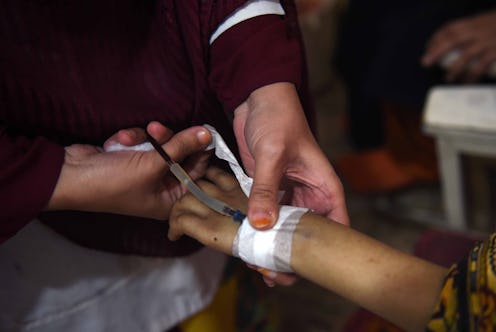Blood donations can save lives — it's a fact. And between June 14's World Blood Donor Day and June 12's heartbreaking mass shooting in Orlando, Florida, talking about safely donating blood has never been so crucial. You might also be wondering if you can donate blood if you have anemia. Because it's the most common reason for refusal, it's important to know the details and guidelines.
First, let's talk about World Blood Donor Day. Established by the World Health Organization (WHO) in 2004, this worldwide celebration was created to raise awareness on the importance of blood, honor volunteers, and promote safe donation practices. The WHO shares that 62 countries depend entirely on the blood donations of voluntary donors. Blood is exactly what keeps people alive, stressing the difference a single donation can make.
Yet, certain rules and precautions must be followed in order to safely donate blood. These are designed to protect both the donor and the person receiving blood. If the guidelines aren't met, a potential donor can be turned down.
Anemia can prevent someone from donating blood. This is indicated by a deficiency of red blood cells, according to the National Heart, Lung, and Blood Institute. It can also be characterized by red blood cells containing low amounts of hemoglobin, the iron-protein that's responsible for carrying oxygen. It's essential for delivering oxygen throughout your body, ensuring that each and every part functions properly.
If you're anemic and donate blood, you could be placing yourself at risk. Losing blood — even a small amount — can take a toll on your body. Common symptoms of anemia are tiredness, weakness, and headaches. These can significantly worsen after donating blood.
So, can you donate? Technically, the answer is yes... if you meet the requirements. You must have the appropriate hemoglobin values, which can be determined by the American Red Cross using a hemoglobin test. For women, this is 12.5 g/dL. For men, this is 13.0 g/dL.
Your primary care physician can also help you determine if you have hemoglobin values ideal for donating. If you do, don't forget to ask your doctor if there are specific ways you can prepare to donate safely.
And if you can't donate? Don't worry; this doesn't mean you can't give back to the community. Consider making a monetary donation to the American Red Cross — even a few bucks helps. You can also bring snacks, water, and juice to blood donors and staff members. Your efforts do matter, even if it's not in the form of blood.
